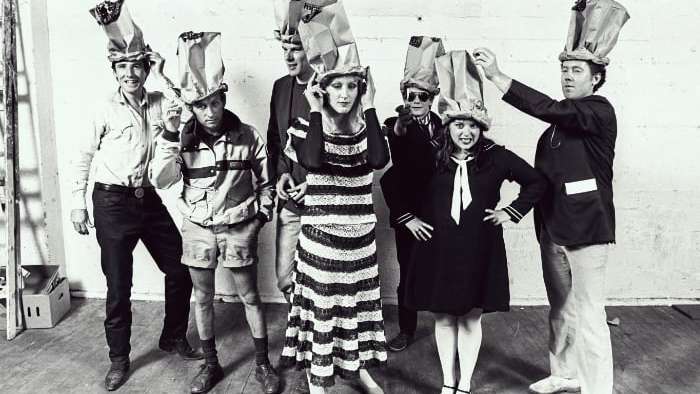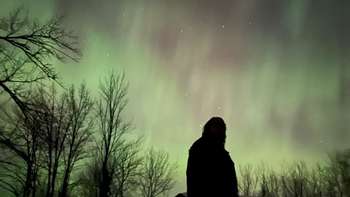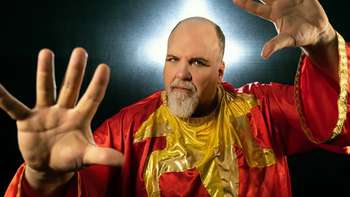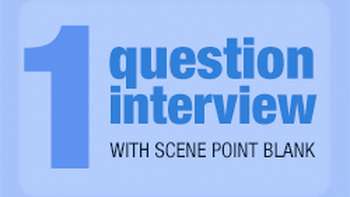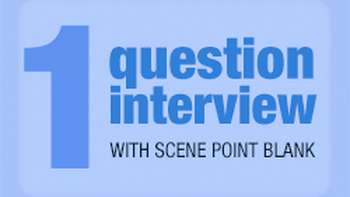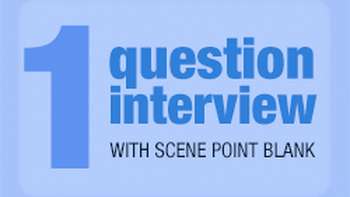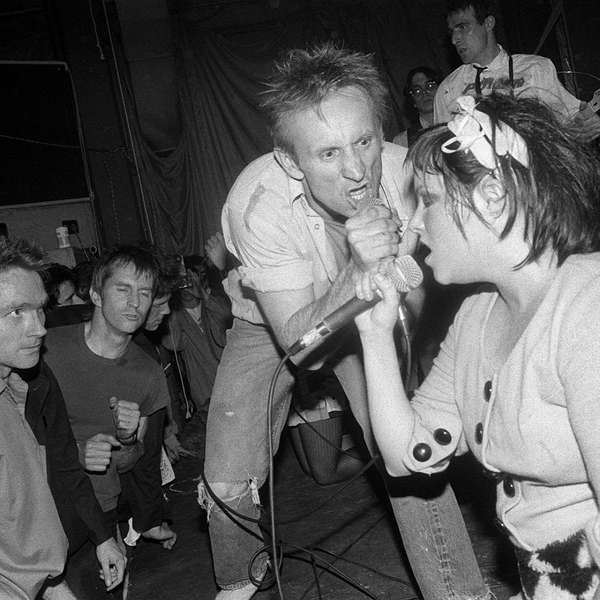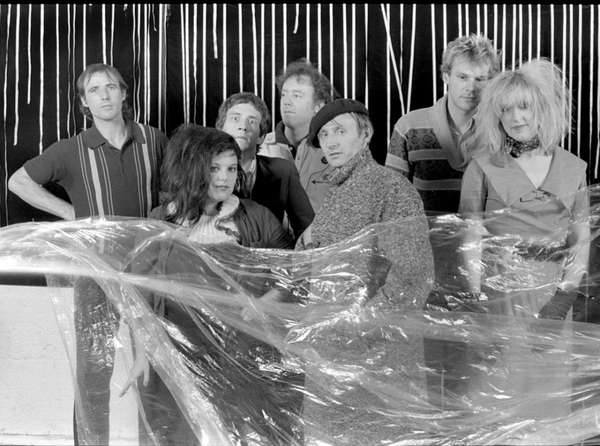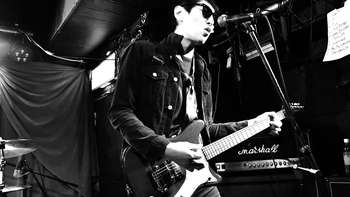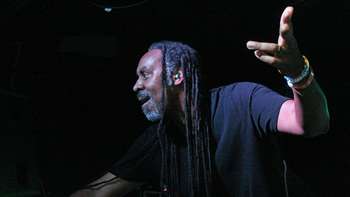Get your best dancing shoes on – we're going out dancing with The Mutants! The Mutants were and are an important influential band in the San Francisco Bay area and beyond, wedged between the original punk scene and the testosterone-fueled hardcore scene that was soon to follow them. For a brief period of time, The Mutants were the kings and queens of the scene with well-lauded live performances and perfectly crafted memorable songs. While the scene has changed significantly since the band’s early years, their well-crafted songwriting skills have stood the sands of time.
The band released Curse of the Easily Amused on July 15 (CD and digital with a vinyl LP planned for later this year), featuring 14 tracks (8 of which have never been released previously).
Scene Point Blank had the opportunity to party with John, Brendan, and Peter. This is what transpired.
--
Interview participants:
John Gullak: Original guitarist & lyricist, plays in the current lineup
Brendan Earley: Original guitarist & composer, plays in the current lineup
Peter Conheim: Reissue producer, remixer, and current bassist
--
Scene Point Blank: How did Curse of the Easily Amused come into this world? Who retained all the sessions and demos culled for this release? What process took place to ensure the best quality possible was utilized for the final product?
Peter: Everything we used on this release was “found” amongst the belongings of Brendan, John, and our late former bass player, Paul Fleming. And at the last minute, Jim Hrabetin – second-generation Mutants guitarist – discovered another lost tape. The Fantasy Studio sessions had basically been lost for a couple of decades before we were able to retrieve them from their vault. And I had already restored the film Emerald City for its director, Rick Schmidt, so the closing track (“Tribute to Russ Meyer”) was more or less done.
The Mutants in "Emerald City"
My whole belief as an archivist/restorationist is to always use the first generation original source tapes whenever possible. Thankfully, everything we had was the original, with a couple of minor exceptions. This is what separates Curse of the Easily Amused from our CD reissue of Fun Terminal 20 years ago, where everything was sourced from dubbed cassettes. We also made the decision to remix some stuff that wasn’t previously final mixes.
Scene Point Blank: Art school seems to have played an important part in how The Mutants met. Which art schools did you attend and were there other people from other bands attending as well?
John: David Carothers (drums), Sue White (vocals), Sally Webster (vocals), and I all met when we attended CCAC (California College of Arts and Crafts) in Oakland. Fritz Fox (vocals) was at SFAI (San Francisco Art Institute). We were all fast friends and collaborated on various art projects, performances, videos, and parties. Joe Reese and Jill Hoffman of the future Target Video were also in that circle as was Ted Falconi of Flipper fame.
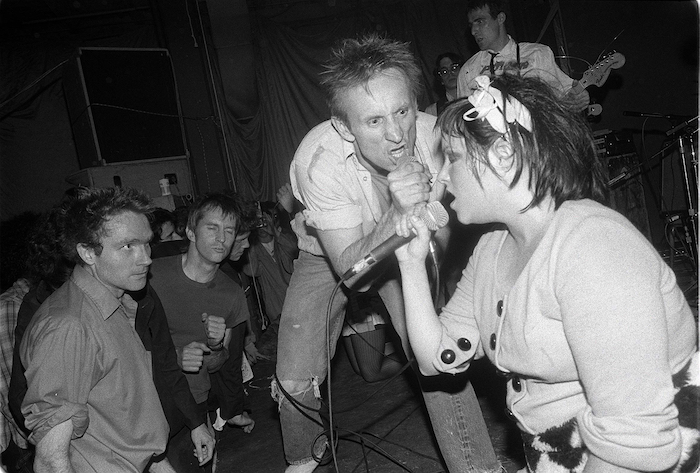
In 1977, David and I had a big party at the warehouse studio we had just moved into in West Oakland. Everybody previously mentioned attended. David, Sue, Sally, Fritz, and I decided we should start a band. Jeff Brogan, the original bass player, was also in attendance. Jeff came up with our band name before he left the group due to personal matters. His wife Keetja sang with us once, at our first Mabuhay gig. Sue and Sally knew Brendan Earley (guitar) from working at Viking's Sub Shop and recruited him. Brendan reluctantly agreed, not knowing what he was getting himself into. Charlie Hagan took over bass, also an SFAI alumnus. By that time, David, Sue, Sally, Fritz, and Charlie were all attending SFAI.
Scene Point Blank: Are any of you still involved in any art form other than that of music?
John: Here is the Instagram account on which I post my art. Here is a 2017 interview I did with “Art Talk”. Sally Webster does wonderful paintings in Brooklyn. Sue White teaches ceramics at UC Davis in California.
Scene Point Blank: I understand that Andy Warhol's Factory, John Water's Dreamlanders, low-budget filmmakers George and Mike Kuchar, and The Cockettes were seen as an inspiration? Can you comment on why? Was performance art an important part of your live shows?
Brendan: Fritz, Sally, Sue, and John were inspired by the artists you mention. I was always more focused on the music, and the band appreciated the pop-oriented hooks that I brought to the equation. Along with our drummer, Dave Carothers, I was focused on the musical backbone. We had several bass players over the years, and fortunately, they were all great.
Fritz was always into thinking of new "performances," new ways to present the band. Sally and Sue, too. I would say the Mutants were always visually striking. Over beers, Fritz and I often had arguments regarding "performances" versus "gigs." I wanted to make enough money to pay for guitar strings and rent, while Fritz was always aiming to make a statement. Fritz was (and remains) quite a character. I remember him drunkenly staggering across the stage at the Mabuhay Gardens, holding a giant tube TV over his head. He eventually let it drop and it smashed into a million pieces. The early shows definitely earned the band an arty reputation. Word of mouth got out: "They're taking art to another level."
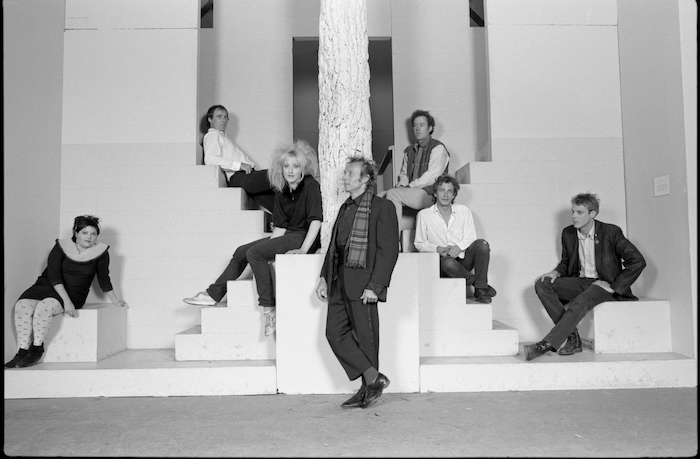
Scene Point Blank: The Mutants played many of the now-legendary concert venues: Whisky A Go-Go/The Masque/The Starwood/Hong Kong Cafe/Hollywood Palladium/Danceteria/Hurrah/The Rat/ No Name and 9:30 Club. Which were your favorites and why?
John: I don’t really remember the specific features of any of the clubs. I do however remember some specific incidents.
We played the Starwood in Hollywood with X. I remember Billy Zoom running around backstage with a big smile and a baggie full of all sorts of pills. We played the 9:30 in Washington, D.C. with the Cramps. Backstage, Fritz got pissed off and stormed out of the dressing room, wildly swinging the door open and slamming it into Lux Interior who happened to be walking by. They started yelling at each other, it almost came to fisticuffs. That would have been interesting. I wonder who would’ve come out on top?
We played the Whiskey with the Go-Gos. There were a bunch of beautiful, long stem roses towards the back of the stage. During our performance, Sally took the roses and threw them into the crowd. The crowd loved it. Turns out the roses were to be presented to Belinda Carlisle later in the evening. OOPS.
When we played the Masque in Los Angeles, the stage was covered in spit, beer, and other fluids. Audience members grabbed my pant legs and started pulling me towards the edge of the stage. I thought for sure I was going to fly off into the audience, but they stopped right at the edge.
Brendan: I remember the Masque being difficult because it was always being shut down and it moved around. Honestly, by 1980, I think we were too poppy for the Los Angeles crowd. Punk rock was quickly turning into hardcore and gigs were getting more violent. We were a fun, poppy band, although we rocked hard. Except for the first few L.A. gigs we did, we felt like outsiders there.
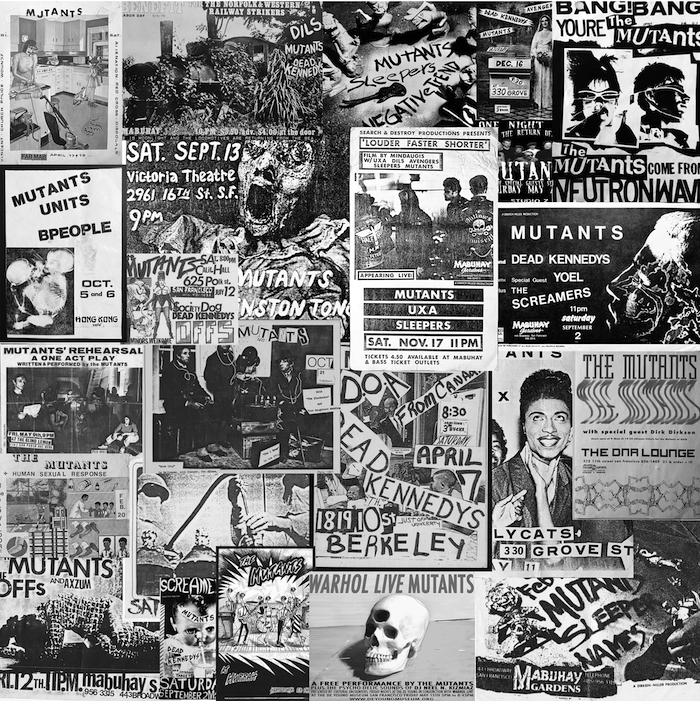
Scene Point Blank: What bands in your history did you share the stage with? What are the most memorable gigs?
John: We did shows with the Ramones, Talking Heads, Public Image, Madness, X, The Cramps, Lene Lovich, Weirdos, Screamers, SPK, B-People, Go-Gos, Zeros, Alley Cats, Middle Class. Can’t remember them all. Of course, we also played with all the Bay Area bands.
We opened for the Talking Heads in Berkeley. Our drummer Dave decided to go out to his van for more drumsticks. When he returned, the doorman wouldn’t let him back in. He didn’t believe Dave was in the Mutants. One of us had to go to the door to vouch for him. By then we were already supposed to be on stage performing. David Byrne was melting down backstage, pacing back and forth literally pulling at his hair. He appeared to be a stickler for punctuality.
Scene Point Blank: Were you aware of Joy Division to any large degree when you were booked to open for them on their first U.S tour?
John: Yes, of course, I knew about Joy Division from the get-go. I was and still am into music. Joy Division was a favorite. I was excited to be opening for them on their U.S. debut performance. When I first heard of Ian’s death, I was sad for him, the band, and his loved ones. The fact that we wouldn’t be opening for them wasn’t lost on me either.
We kept the date at Hurrah’s, only instead of Joy Division, it was 999 from England. It was also our debut in NYC. There was a large amount of ex-San Francisco people in the audience, which was a nice surprise.
Brendan: John loved Joy Division and turned me onto them. The music struck me as plaintive, affecting, and true despair. I was really looking forward to playing Hurrah with them and a few other shows, maybe the Mudd Club. Our flights had already been booked.
I also was a big fan of The Cure's early work. I loved Robert Smith's musical sensibility, the spareness of it. The Mutants were never a spare band. As we progressed, I started to use less full, dense chords. I switched to single-note melody lines, trying to get closer to the sound of The Cure. There was so much space in their music, so much less density. Half the songs were instrumentals on those early Cure albums.
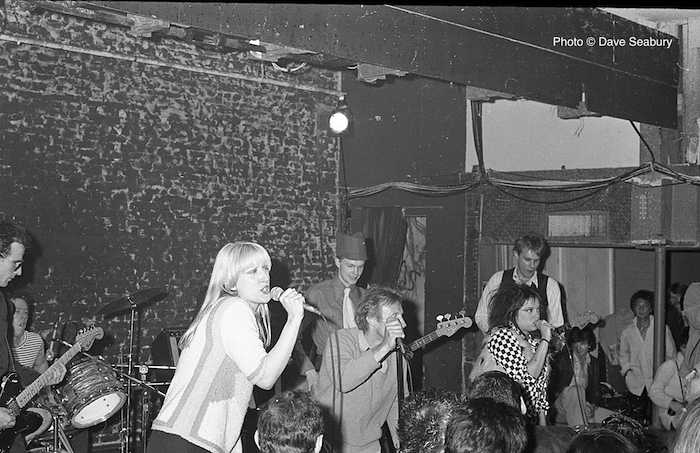
Scene Point Blank: Prior to The Mutants forming, how important was the previous scene that existed (Crime, Nuns, Dils, Avengers) in helping you develop as a band?
John: For me, it was mostly the shared excitement of community and purpose, the contagious energy. We never wanted to be like any of the other bands, I mean why would we? They’re already doing their thing. We were the Mutants.
Scene Point Blank: Are there other bands that co-existed with The Mutants that deserve a mention? Anybody that you felt never really got the attention they deserved?
Brendan: Fast Floyd & the Famous Firebirds. Fast Floyd's girlfriend was a gal named Silke Berlinn, and she was also in his band. Floyd was from New York, a truly tough guy from the Lower East Side. He had been in a band with Mink DeVille. He was the real thing, kind of a dangerous punk. He and Silke were a couple, and they were always fighting -- true-life trash & romance. He was convicted of some drug offenses and got thrown in jail for a long time. He eventually killed himself. I was also from New York and went to high school there. I learned how to act tough but I wasn't really a tough guy. Floyd was a skinny guy, right out of the Johnny Thunders school. Not afraid to go all the way. He had no limit, he was driven, crazy. He was not a musical genius, but I think he was more authentic than anybody else on the scene. I later backed up Silke when she had her own band, I played bass.
There was also a local San Francisco band called the Offs. I liked when they went into a more skanking, reggae direction. They had started out more arty.
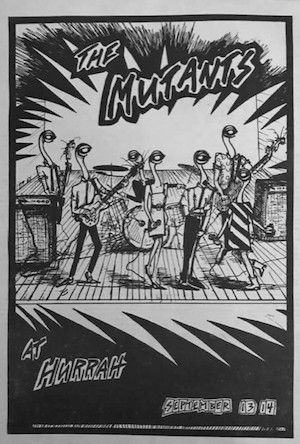 John: I always enjoyed Pink Section. They were a lot of fun. That was before the scene became hardcore, male-centric, and started emulating high school athletics.
John: I always enjoyed Pink Section. They were a lot of fun. That was before the scene became hardcore, male-centric, and started emulating high school athletics.
Scene Point Blank: How many gigs in your history do you figure you have played?
John: Tons. We had a busy schedule, we rehearsed Tuesdays and Thursdays at 1st Street where Sally lived. We were fortunate to have that space to rehearse. We’d often perform on the weekends.
Scene Point Blank: The Mutants played a now-infamous show at The Napa State Mental Hospital. Footage of The Cramps is well shared. Did Joe Rees of Target Video shoot any Mutants footage? If so, does it still exist?
Brendan: Howie Klein of 415 Records set up the Napa gig. It was originally supposed to be us, and then Howie learned the Cramps were coming to town. Honestly, I was a little leery of it. My suspicions turned out to be correct because we ended up right in the middle of the melee. Some members of the band felt right at home during it all. Sally and Fritz had taken some psychedelics and there was complete empathy between them and the crowd. There were always at least ten people following Sally around. She was simpatico with them; her defenses were down.
Howie told a story about helping a few inmates escape. He gave them a ride back to the city.
John: It was a totally unique experience. I’m fortunate to have been a part of that. I think it’s an example of music’s power to communicate where other forms might fail. There does exist a video of our performance at Napa. For years Target Video had different reasons why they didn’t video our performance. It turns out they did videotape us after all. The tape was recently discovered on an unmarked reel. That was a happy discovery.
Scene Point Blank: The Mutants are well regarded for your energetic live shows. Do you feel that this energy was truly captured on the Fun Terminal LP or the "New Dark Ages" single?
JOHN: It’s difficult to recreate the energy of a live performance. I think those recordings you mention are good recordings even though they may not totally capture the live energy. They show another side of the Mutants. Those are good songs. The Mutants wrote good songs. There’s more to the Mutants than just “live” performances.
Scene Point Blank Why did an album not appear on 415 Records after they had released your debut 45?
Brendan: We hedged on 415 because we never received any money from the "New Dark Ages" single. Fritz and I were the main songwriters and the single was selling. I think they sold 7,000 or 8,000 but we only got a check for $100. Fritz and I assumed we would get half the money, which was naïve -- we didn't have the publishing, copyright, or a manager. The 415 contract basically said, "We'll share the profit." I personally wanted to go with 415 because I admired David Kahne's production work. But the money from that first single was a big disappointment, especially for Fritz. Howie made us an offer of $10,000 to record with David Kahne at the Automatt, which was a topline studio. But there would be no advances for the band, no money upfront.
For the MSI deal, we each got $2,000. At the time we thought "WOW." I was finally able to afford guitar strings!
Sally was very disappointed that we didn't go with 415. She and Howie go way back. But Fritz had an adamant nature, and he was against the idea.
"For the MSI deal, we each got $2,000. At the time we thought "WOW." I was finally able to afford guitar strings!"
John: MSI offered us more money upfront. We all needed money. If we had known how screwed up MSI was, maybe we’d have gone with 415.
Scene Point Blank: Do you feel that Paul Wexler sanitized the group in the recording sessions for Fun Terminal? Was he trying to make you too poppy to emulate his success with the Go-Go's?
John: I love Paul Wexler, but YES.
Brendan: I wanted success, so I welcomed Paul Wexler. I was impressed with what he had done for the Go-Go's. I like pop music and I appreciate great hooks and production. John was not for it. He wanted it to be arty and raw. We had done an earlier 5-song demo with Paul, which was great. For that first session, we had been on tour and were really tight.
Scene Point Blank: How did you connect with Snakefinger (Philip Lithman)? What was it like working with him? What did he bring to the Fun Terminal sessions?
John: Phil was great; I mean the Residents, come on. I don’t remember the details of how we met. Phil seemed to understand the Mutants and was able to help us be the Mutants in the studio. He understood the underground scene we came out of and how to help us be ourselves and do what we do best without having preconceived ideas about what we “should” sound like. He didn’t try forcing us into a mold of what he thought we should be. He let us be ourselves and used that as a strength.
Scene Point Blank: Will the EP that was recorded in 1984 with the later version of the band ever be released?
Brendan: As an EP, probably not. But we did get the 24-track tape back for one of those songs, "Missing In Action." It appears on Curse of the Easily Amused. I wasn't on those sessions. I was one of the first people to leave the band. By the time those recordings happened in 1984, it was basically the three singers and a new band. The drummer went on to be one of the co-owners of Amoeba Records. "Missing In Action" is a great song, a mournful song; I interpret it as an A.I.D.S. requiem.
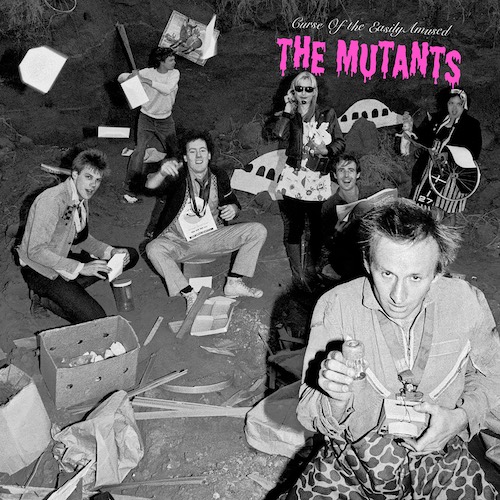
Over the years, we paid for a lot of our recordings. We worked day jobs to save up to pay our studio costs. We produced a lot of our own recordings, which led to a lot of fights and disagreements. The girls were the ones who had the bank accounts; they also booked most of our shows. There was a lot of friction in the inner workings of the band.
Scene Point Blank: How are four original members still playing together four decades later?
Brendan:: A friend of ours reissued the Mutants' only studio album, Fun Terminal, in 2002. We got together to play a friend's birthday. I think Fritz was living in New York at the time, but he was in town. We had Fritz on vocals, Paul on bass, Dave on drums, Sue on vocals, and I was on guitar. Sally was already living in New York. John didn't want to do it -- he's not a guitar player except for the Mutants -- so he was out of practice. After that show, we gigged sporadically: once, maybe twice a year. We would mostly play museums. If the show had anything to do with art, Sally and Sue were on board. We played the Museum of Modern Art in Denver but Sally and Sue decided to sit that one out. So, we had cardboard cut-outs of them! Fritz has always said, "Let's get together and play," even though he was living in New York and, later, Colorado.
Scene Point Blank: How would you like to be remembered?
John: One of the great bands to come out of the early San Francisco Punk Rock Scene.
